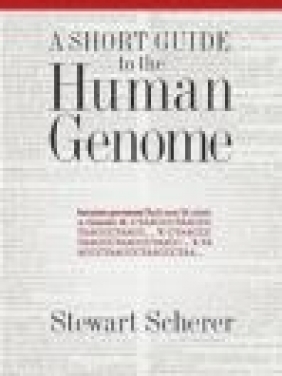Short Guide to the Human Genome
Stewart Scherer, S Scherer
Short Guide to the Human Genome
Stewart Scherer, S Scherer
- Producent: Cold Spring Harbor Laboratory Press
- Rok produkcji: 2008
- ISBN: 9780879697914
- Ilość stron: 173
- Oprawa: Miękka
Niedostępna
Opis: Short Guide to the Human Genome - Stewart Scherer, S Scherer
How many genes are in the human genome? Which genes are commonly associated with genetic diseases? How many mobile elements, simple sequence repeats, or protein kinases are encoded in the genome? What are the largest genes and proteins? How similar are human proteins to those of mouse, yeast, or bacteria? Although the human genome has been sequenced, it often can be surprisingly difficult to find answers to seemingly simple questions about its characteristics. This convenient handbook, written in question-and-answer format, allows researchers and teachers alike access to basic facts about the human genome. Using a recent assembly of the human genome sequence, Stewart Scherer has compiled answers to a broad range of questions about the structure and function of the human genome. Answers to each question are presented in a direct, straightforward style. Numerous figures and tables are included to illustrate and summarize the information. Scherer has compiled a wonderful text that not only answers many of the kinds of questions that I can think to ask about the human genome, but the kinds of questions that I get from my students and other instructors. The whole book in fact consists of questions and answers. Although the book truly is short in length, 173 pages including the index, it's long on the kinds of answers that you'd like to have at your fingertips. These kinds of analyses are not readily available from skimming the databases. I know from personal experience that gathering these kinds of data and compiling them so nicely in tables and readily accessible summaries takes time and effort. Clearly, Scherer has spent many hours doing the research to put this book together. As a researcher, I would want 'A Short Guide to the Human Genome' for quick reference. As an instructor, this text is going to serve as a really great source of questions to ask my students. I also think, since it mostly addresses the human genome, the questions inside suggest a wealth of potential student projects with genomes from other organisms. -- Sandra Porter FinchTalk It's a fun little review; appropriate for browsing during your 'in-between' time. As the title emphasizes this guide is characterized by extreme brevity, under 200 pages. Nevertheless it attempts a survey of the major results which have come to light over the past decade in human genomics. -- Razib Khan, GeneExpression1. Introduction 2. DNA and Chromosomes What Is the Size of Each Chromosome? What Is the Base Composition of the Nuclear Genome? What Is the Base Composition of the Mitochondrial Genome? What Is the Frequency of Each Dinucleotide? Does Base Composition Vary Among the Chromosomes? What Are the Frequencies and Sizes of Simple Sequence Repeats? Which Sequences Are Present at the Centromeres? What Are the Sequences at the Telomeres? 3. Genes How Many Protein-coding Genes Are Present in the Genome? Is Gene Density Uniform Across the Chromosomes? How Common Are Pseudogenes? What Is the Size of a Typical Gene? What Are the Largest Genes? Which Genes Have the Most Exons? Does Exon Number Correlate with Gene Size or Protein Size? What Is the Size of a Typical Exon? What Is the Size of a Typical Intron? Which Genes Have the Largest Introns? Do Gene-rich Chromosomes Have Smaller Genes? How Are CpG Islands Associated with Genes? Do Large mRNAs Have Large UTRs? Which Genes Are Located in the Introns of Other Genes? Which Genes Are Present in the Mitochondrial Genome? How Are Genes Organized in the Mitochondrial Genome? 4. RNA How Are the Ribosomal RNA Genes Organized in the Genome? Which Transfer RNAs Are Present in the Genome? Which Genes Host Small Nuclear RNAs and Small Nucleolar RNAs? How Are microRNA Genes Distributed in the Genome? What Is the Size Distribution of snRNA Genes and Related Sequences in the Genome? What Are the Sequences at Splice Junctions? Which Genes Use RNA Editing? 5. Proteins What Is the Size of a Typical Protein? What Is the Amino Acid Composition of a Typical Protein? How Do Mitochondrial Proteins Differ in Composition from Typical Proteins? Which Amino Acids Are Commonly Located in the Amino-terminal Region of a Protein? Which Amino Acids Are Commonly Located in the Carboxy-terminal Region of a Protein? What Are the Largest Proteins? Which Proteins Have Large Homopolymer Tracts? What Proteins Are Rich in Particular Amino Acids? For Proteins That Are Rich in a Specific Amino Acid, How Are the Residues Distributed Across the Polypeptide Chains? Which Proteins Lack Specific Amino Acids? Which Proteins Are Post-translationally Cleaved into Multiple Hormones and Related Peptides 6. Translation and Protein Modification How Does Codon Usage Vary Among Human Genes? Which Proteins Contain Selenocysteine? Which Amino Acids Are Introduced into Proteins by Post-translational Modifications? Which Sequences Are Associated with the Formylglycine Modification? Which Proteins Contain b3;-Carboxyglutamate? 7. Gene Families How Are DNA Polymerases Related to Each Other? How Are the Histone Gene Families Organized? How Are the Keratin Genes Organized? How Many Protein Kinases Are Encoded in the Genome? Which Types of Proteases Are Found in the Human Genome? How Many Genes Are in the Major Transcription Factor Families? Which Are the Important Residues in the Homeobox? How Are the HOX Genes Organized? Which Sequences Are Shared in Helix-loop-helix Transcription Factors? Which Residues Define the DEXD Helicases? Which Are the Conserved Features of the WD Domain? How Are the Olfactory Receptor Genes and Pseudogenes Distributed in the Genome? How Are the Taste Receptor Genes and Pseudogenes Distributed in the Genome? 8. Mobile Elements and Rearranging Genes How Much of the Genome Is Composed of Mobile Elements? What Types of L1 Elements Are Present in the Genome? What Is the Number and Size Distribution of Alu Family Sequences in the Genome? What Are the Common DNA Transposons in the Genome? Which Endogenous Retroviral Genomes Are Largely Intact? Are the Immunoglobulin and T-cell Receptor Loci Very Large? How Are the Immunoglobulin Genes Organized? How Are the T-cell Receptor Loci Organized? What Sequences Direct DNA Joining at the Immunoglobulin and T-cell Receptor Loci? 9. Polymorphism What Is the Frequency of Single Nucleotide Polymorphisms in the Genome? Which ABO Allele Is in the Reference Genome? How Variable Are the HLA Proteins? Which Genes Have Common Polymorphisms? Which Genes and Alleles Are Associated with Common Genetic Diseases? Which Genes Function as Tumor Suppressors? 10. Comparative Genomics What Are the Major Differences Between the Human and Mouse Genomes? How Do the Mitochondrial Genomes Vary Among Species? How Does Codon Usage Differ in the Eukaryotes? How Similar Are Human Proteins to Those in Other Species? How Similar Are Human Genes to Those in Other Species at the Nucleotide Level? How Are Human and Bacterial Ribosomes Related? Are Human DNA Replication Proteins Related to Those of Bacteria? Are Human Proteins for mRNA Processing Functions Conserved in Eukaryotes? How Does Protein Sequence Conservation Differ Among the Histone Types? How Conserved Are the Branches of the Ras Superfamily? How Do the Sizes of Gene Families for Structural Proteins Vary Among the Eukaryotes? How Large Are Gene Families for Developmental Signaling in Animals? Which Species Have Genes Related to Those with Functions in Human Host Defense? Which Human Proteins Are Related to Retroviral Proteins? Human Gene Index
Szczegóły: Short Guide to the Human Genome - Stewart Scherer, S Scherer
Tytuł: Short Guide to the Human Genome
Autor: Stewart Scherer, S Scherer
Producent: Cold Spring Harbor Laboratory Press
ISBN: 9780879697914
Rok produkcji: 2008
Ilość stron: 173
Oprawa: Miękka
Waga: 0.39 kg

































